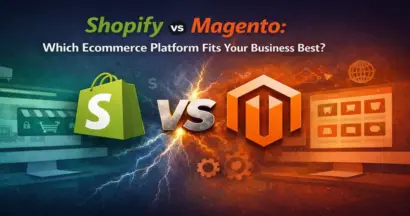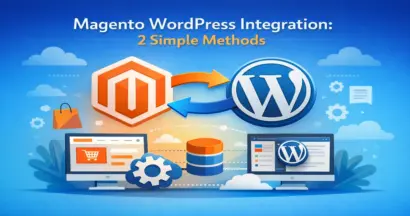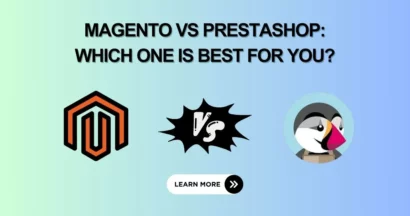Business-to-business or B2B sales have largely moved online. B2B online sales are expected to grow significantly, making a strong online presence essential for manufacturers, wholesalers, and distributors. This presence is built on technology, and selecting the right B2B commerce platform is an important business decision. It affects operational efficiency, customer relationships, and revenue growth.
A good platform simplifies complex tasks like large-volume ordering, custom pricing, and inventory management, which are common in B2B. With many options available, finding one that fits your e-commerce business models, budget, and goals for future growth can be difficult. To help your search, we have reviewed the market and made a list of eight top B2B e-commerce platforms that provide the features needed for success.
Eduma – Education WordPress Theme
We provide an amazing WordPress theme with fast and responsive designs. Let’s find out!
Top 8 B2B Commerce Platforms for Growing Businesses
Here are eight effective and reliable platforms designed to manage the requirements of B2B sales.
1. Shopify

Shopify is a very popular name in eCommerce. Its advanced version, Shopify Plus, is a leading choice for B2B companies. It is known for its easy-to-use interface, a large selection of apps, and a strong technical foundation. This makes it a good option for businesses that need many features without requiring a lot of technical work to set up.
Shopify Plus is built to manage a high number of sales and offers specific tools for wholesale businesses.
Key Features
- Wholesale Channel: You can create a separate online store for wholesale customers that is protected by a password, with special price lists and payment terms.
- Advanced Customization: Provides access to code for more control over the customer’s buying experience, along with many options to connect with other systems through APIs.
- Automation Tools: Use a tool called Shopify Flow to handle routine tasks automatically, such as checking for fraud, managing inventory, and organizing customers into groups.
- High Scalability: Designed to process thousands of transactions per minute, which helps your site stay fast and dependable during busy times.
2. BigCommerce
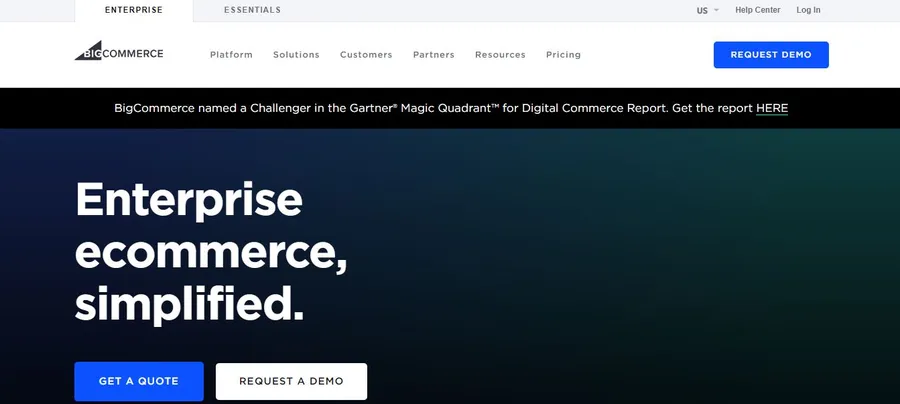
BigCommerce is a leading SaaS e-commerce B2B platform that is notable for its many built-in features. Its goal is to give businesses useful tools without needing many third-party applications. BigCommerce is very effective for businesses that sell to both other businesses (B2B) and individual consumers (B2C), as it allows for easy management of different customer types from one control panel.
Key Features
- Customer Groups & Price Lists: You can easily organize customers into groups and give each group different pricing, visible products, and discounts.
- Headless Commerce: It has a flexible technical design that lets you show your content on any website or device, offering excellent customization possibilities.
- Quote Management: Includes a built-in system for customers to request a price quote, and for you to manage and turn those quotes into orders.
- ERP & CRM Integration: Offers ready-made connections to major business systems like NetSuite, Microsoft Dynamics 365, Salesforce as well as copilot studio pricing
3. Adobe Commerce (Formerly Magento)
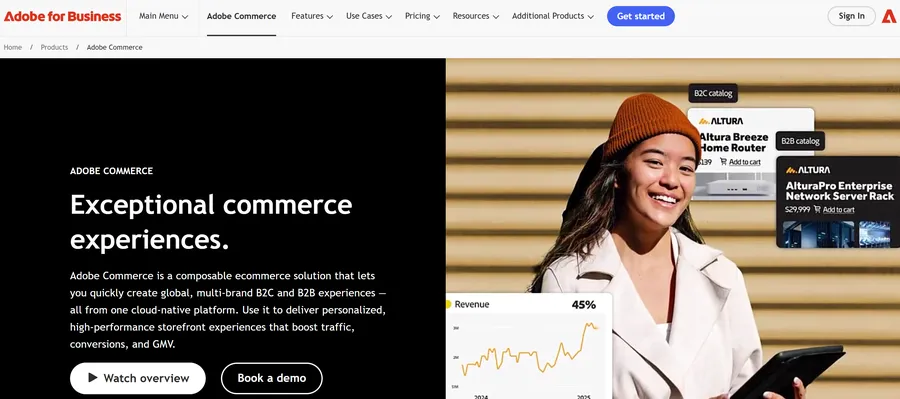
Adobe Commerce, also widely known as Magento, is a very powerful platform for B2B eCommerce. It is an open-source platform known for its great flexibility, ability to grow, and large number of features. It is a suitable B2B e-commerce platform for large companies and businesses with complex product lists, special procedures, and specific connection needs that other platforms cannot handle easily.
Key Features
- Advanced B2B Functions: Includes built-in features for managing company accounts, allowing quick ordering by product code (SKU), handling quote requests, and creating shared product catalogs.
- Complete Customization: Because it is open-source, developers have full control over the code, which allows for any custom feature or system connection to be built.
- Multi-Store Management: You can manage several brands or stores from a single control panel, which is ideal for businesses operating in different countries.
- Strong Scalability: It is proven to handle very large product catalogs and a high number of transactions without losing performance.
4. WooCommerce B2B
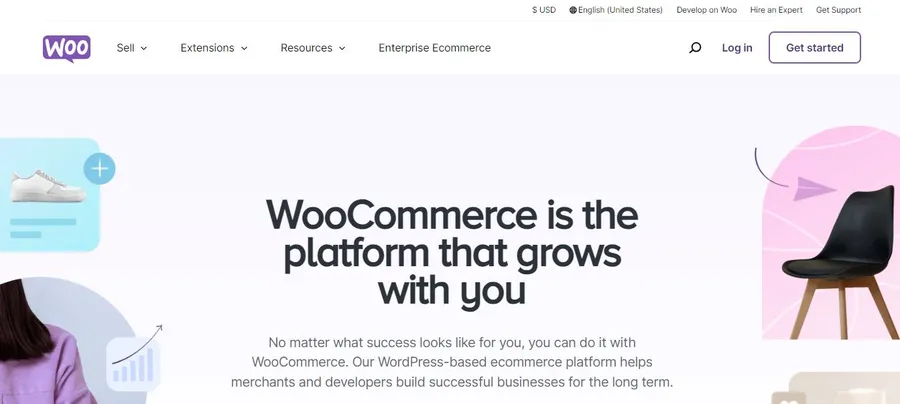
WooCommerce is a flexible open-source plugin that can turn any WordPress website into a full eCommerce store. For B2B, its main strength is its flexibility, which comes from a large collection of available extensions and plugins. It is a lower-cost and highly customizable choice for small to medium-sized businesses that are already familiar with WordPress.
Key Features
- Large Plugin Selection: You can add specific B2B features, such as wholesale pricing or different rules for product visibility, by using available extensions.
- Content and Commerce Integration: You can easily combine your marketing content with your sales activities by using the strong blogging and content management systems of WordPress.
- Full Ownership & Control: Since it is a self-hosted solution, you have full control over your company’s data, your website’s hosting, and all of its code.
- WooCommerce Pricing: The main WooCommerce plugin is free. Businesses only pay for hosting, a design theme, and any special B2B extensions they choose to use.
5. Oracle NetSuite Commerce
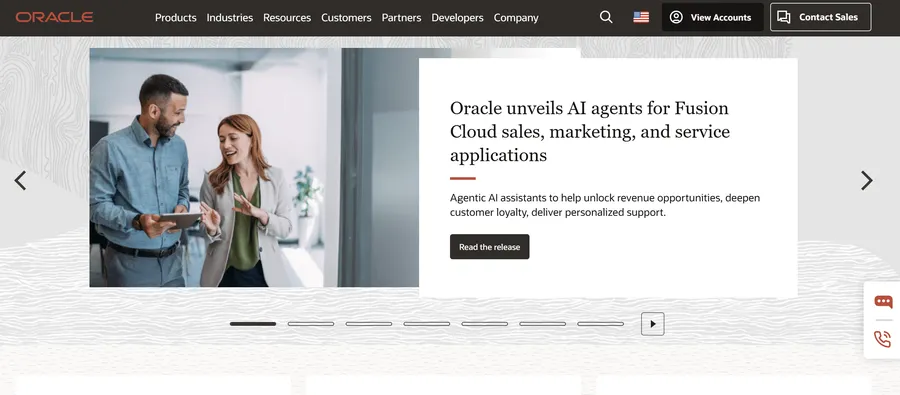
Oracle NetSuite Commerce is a unified cloud solution that seamlessly integrates eCommerce with your back-office systems, including inventory, order management, CRM, and financials. This B2B commerce platform is designed for mid-sized to large enterprises that want a single source of truth for their entire business operations. It provides a comprehensive view of customers and business performance in real time.
Key Features
- Unified Business Platform: A single system to manage everything from your online store to your supply chain, eliminating data silos.
- Real-Time Data Visibility: Access live inventory levels, order statuses, and customer data across all channels.
- Personalized B2B Experiences: Offer customer-specific pricing, catalogs, and terms directly from your ERP data.
- Global Capabilities: Supports multiple currencies, languages, and tax regulations for international commerce.
6. CS-Cart Multi-Vendor
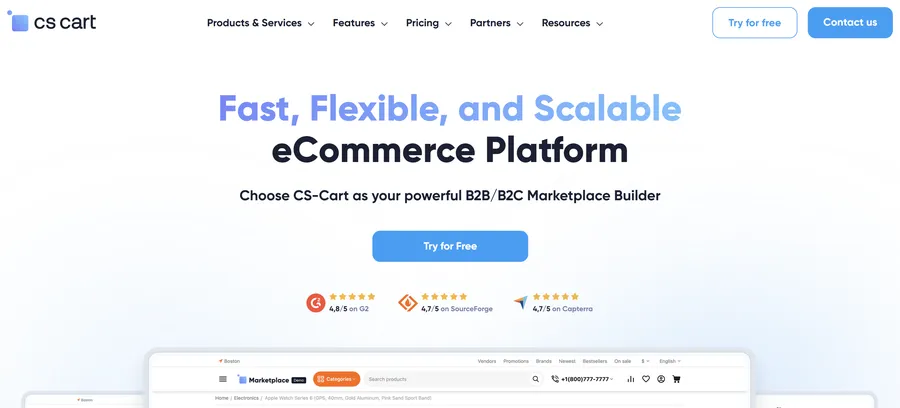
CS-Cart is a unique solution focused on building online marketplaces. While it can function as a standard store, its real power is in its multi-vendor capabilities. This makes it an exceptional choice for businesses that want to create a B2B marketplace where multiple suppliers can sell their products. It provides comprehensive tools for both the marketplace owner and the individual vendors. Many growing companies use these B2B commerce platforms.
- Key Features
- Advanced Vendor Management: Each vendor gets their own mini-store and admin panel to manage products, orders, and shipping.
- Flexible Payout System: Automate commission calculations and vendor payouts to streamline financial operations.
- Customizable Vendor Plans: Create different subscription tiers for vendors with varying permissions, commissions, and feature access.
- Built-in Marketing Tools: Comes equipped with SEO tools, cross-selling features, and promotional functionalities.
7. PrestaShop
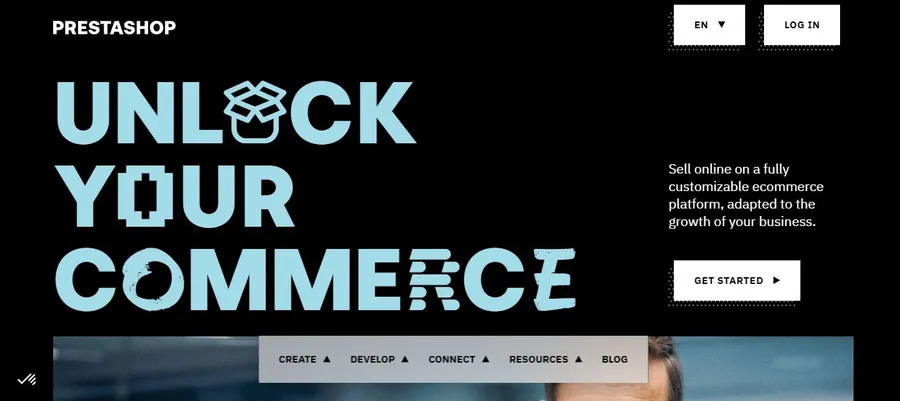
PrestaShop is another popular open-source e-commerce B2B platform known for its active community and extensive module marketplace. It provides a solid foundation of eCommerce features that can be expanded with B2B-specific add-ons. It’s a great option for businesses in Europe, where it has a strong foothold, and for merchants looking for a balance between affordability and customization without the complexity of Magento.
- Key Features
- Large Module Marketplace: Access over 3,000 modules to add features like quote management, private sales, and customer group pricing.
- Intuitive Admin Interface: Features a user-friendly dashboard that makes managing products, orders, and customers straightforward.
- Multi-Store Support: Manage several stores from one back office, which is useful for catering to different customer segments or regions.
- Strong International Focus: Offers support for multiple languages and currencies out of the box.
8. Znode
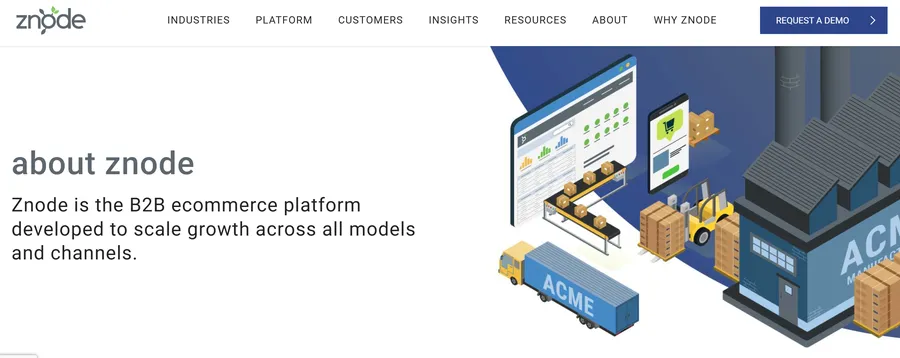
Znode is a headless, API-first B2B commerce platform built for manufacturers and distributors with complex needs. Its “API-first” approach means it is designed for flexibility and integration, allowing businesses to create highly customized and unique user experiences across any channel. Znode is built on .NET and is praised for its ability to handle complex catalogs and pricing structures.
- Key Features
- Headless Architecture: Decouples the frontend (what the customer sees) from the backend, allowing for complete design freedom and integration with any system.
- Built-in PIM: A native Product Information Management system helps manage complex product data and catalogs efficiently.
- Multi-Store & Multi-Vendor: Supports the creation of multiple storefronts and B2B marketplaces from a single instance.
- Scalable & Extensible: The modern architecture is designed for high performance and can be extended to meet unique business workflows.
Final Thoughts
The process of finding the right B2B commerce platform requires a careful review of your business needs, technical capabilities, and long-term goals. Whether you need something easy to use like Shopify, one with complete customization like Adobe Commerce, or a connected system like Oracle NetSuite, the right platform will help your business grow. It will allow you to build stronger customer relationships and increase sales in today’s digital world.
Frequently Asked Questions (FAQs)
1. What is the main difference between B2B and B2C eCommerce platforms?
B2B platforms are designed for business needs like special pricing for contracts, large-volume orders, purchase orders, and customer-specific product lists. B2C platforms are generally simpler and focus on sales to individual customers with standard pricing.
2. Is an open-source b2b e-commerce platform a better choice?
It depends on your company's resources. Open-source platforms like Magento offer great flexibility but require more technical skill to set up and maintain. SaaS platforms like Shopify are easier to manage but offer fewer options for deep customization.
3. How much does a b2b commerce platform usually cost?
Costs can differ greatly. SaaS platforms typically have a monthly fee plus transaction fees. Open-source platforms do not have license fees, but you must plan for the costs of development, hosting, security, and ongoing support.
5. Can my business switch from one B2B platform to another later?
Yes, moving to a new platform is possible, but it can be a complex and time-consuming project. It requires transferring all customer data, product information, and order history. It is important to plan this process carefully to avoid service interruptions or data loss.
Learn more: A Guide to the 14 Best Email Marketing Platforms
Contact US | ThimPress:
Website: https://thimpress.com/
Fanpage: https://www.facebook.com/ThimPress
YouTube: https://www.youtube.com/c/ThimPressDesign
Twitter (X): https://x.com/thimpress_com

